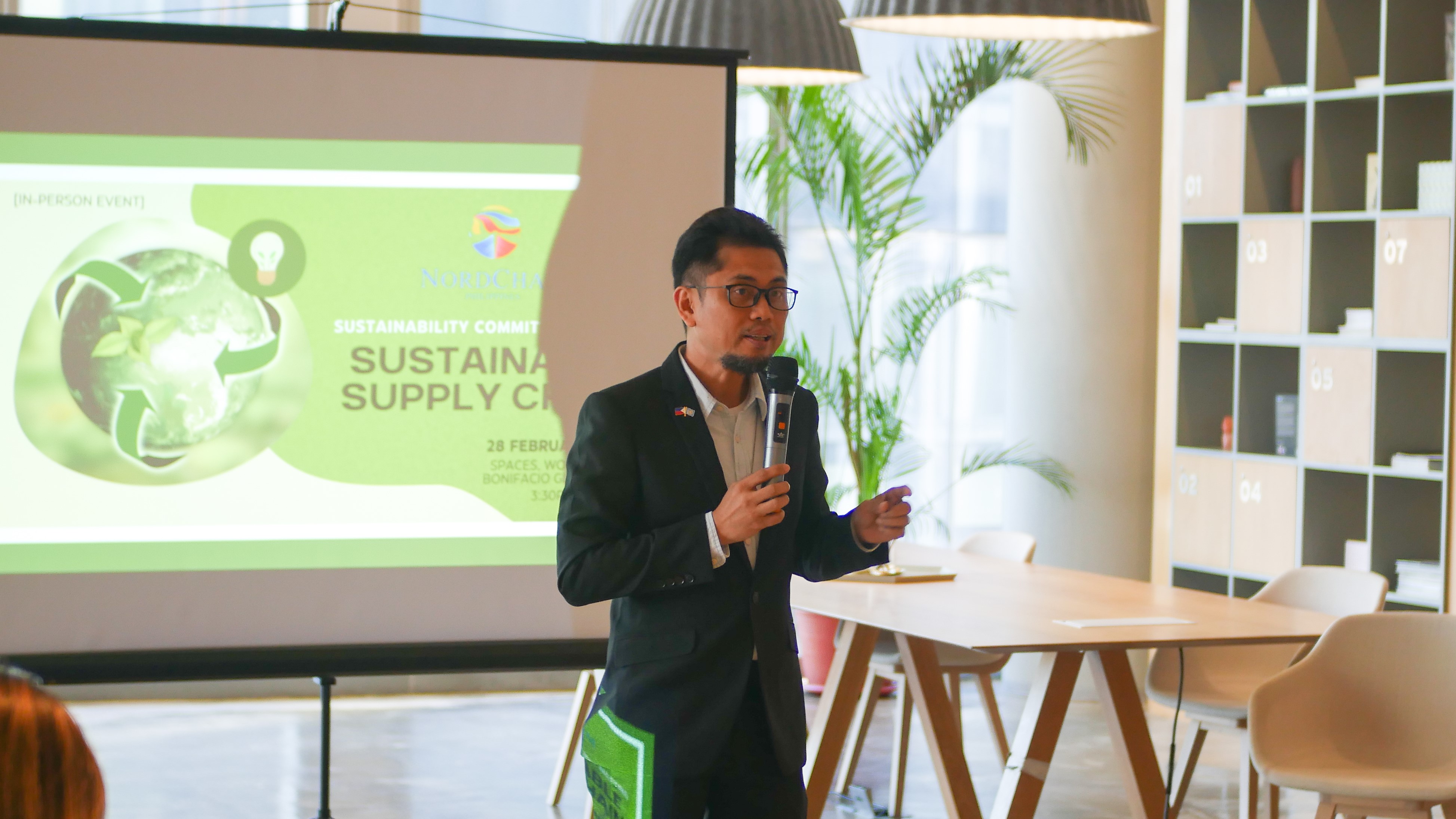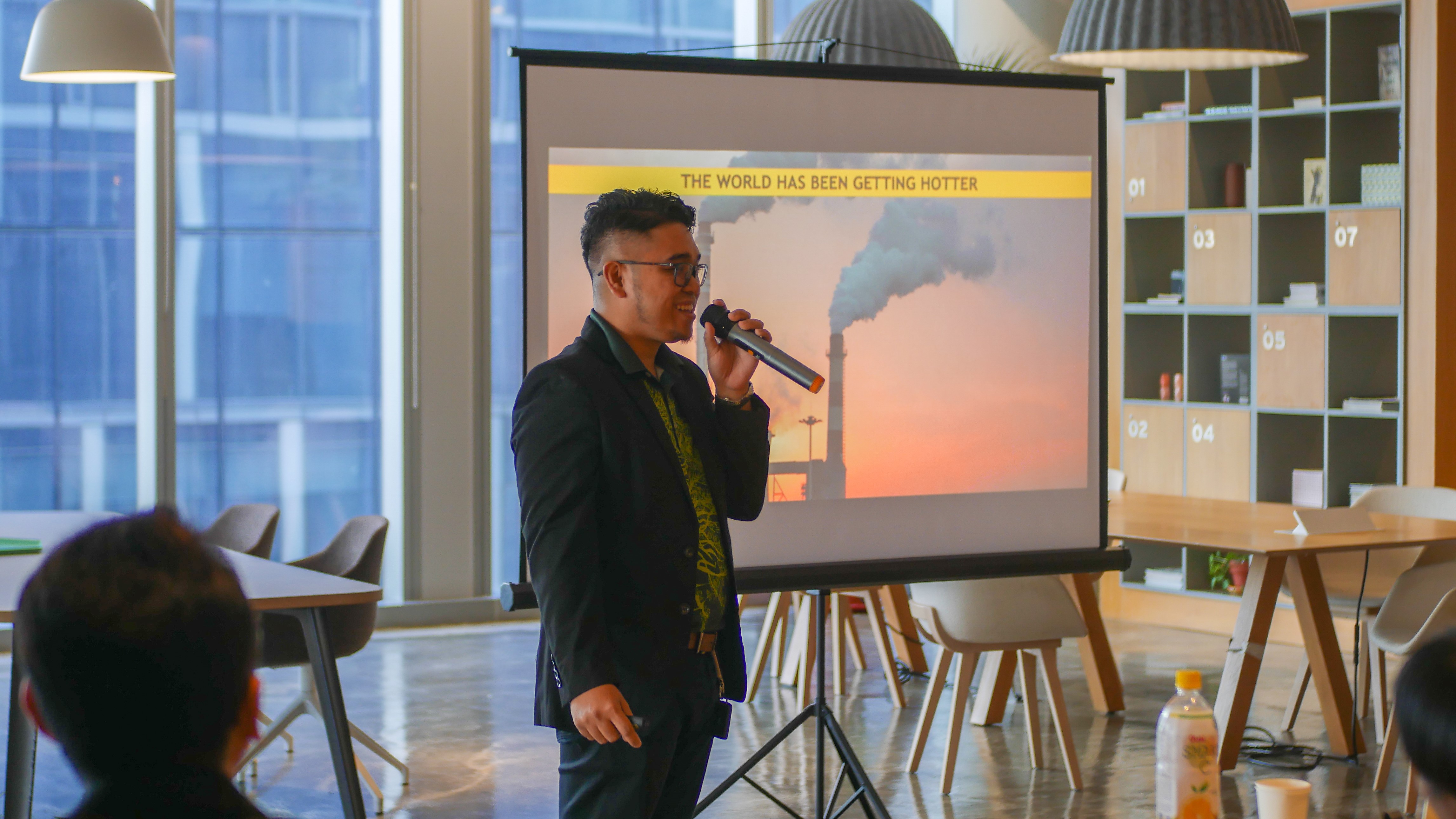‘Sustainability involves meeting the needs of the present without compromising the ability of future generations to meet their own needs.’—Insights from the Sustainability Committee Meeting for February
On 28 February 2024, the Nordic Chamber of Commerce of the Philippines hosted the Sustainability Committee Meeting for the month of February with the topic about building resilient and sustainable supply chains held at Spaces - Manila, World Plaza, Bonifacio Global City.
Various representatives from different companies and organizations attended the event, namely: Artelia Philippines, Inc., Asia Clean Energy Partners Limited, Antrak Philippines, Business Profiles Inc., DITO Telecommunity, Filtra Timber Trading, Global Compact Network Philippines, John Clements Consultants, Inc., National ICT Confederation of the Philippines (NICP), Odfjell Technology Philippines Corporation, One Earth - One Ocean, PCX, Praetor Logistics Philippines, Scandi Divers, University of the Philippines (School of Business). Check out some of the key highlights of the discussion below.
THE TEN PRINCIPLES OF THE UN GLOBAL COMPACT
The discussion began with a presentation by Edward Marcel Gacusana, the Executive Director of the Global Compact Network Philippines (GCNP), on the United Nations Global Compact (UNGC) Ten Principles and Sustainable Supply Chain.

Edward started his presentation by defining sustainability as 'meeting the needs of the present without compromising the ability of future generations to meet their own needs.' He then proceeded to discuss the Ten Principles of the UN Global Compact for sustainable supply chain and on how it plays a crucial role in promoting responsible business practices not only in the Philippines, but as well as abroad. He pointed out that these principles are derived from key international agreements and standards, encompassing human rights, labor, environment, and anti-corruption. The following is a summary of these 10 principles:
Human Rights:
- Businesses should support and respect the protection of internationally proclaimed human rights within their sphere of influence.
- Businesses should make sure that they are not complicit in human rights abuses.
Labour Standards:
- Businesses should uphold the freedom of association and the effective recognition of the right to collective bargaining.
- Businesses should eliminate all forms of forced and compulsory labor.
- Businesses should abolish child labor.
- Businesses should eliminate discrimination in respect of employment and occupation.
Environment:
- Businesses should support a precautionary approach to environmental challenges.
- Businesses should undertake initiatives to promote greater environmental responsibility.
- Businesses should encourage the development and diffusion of environmentally friendly technologies.
Anti-Corruption
- Businesses should work against corruption in all its forms, including extortion and bribery.
To secure sustainability, Edward underscored the need to support both the workforce and the community, set expectations for businesses and leaders, and address challenges encountered by suppliers. As an example, he highlighted their efforts at the Global Compact Network Philippines (GCNP), serving as a catalyst for sustainable development in the country. He pointed out that in GCNP, they try to raise awareness about the Ten Principles of the UN Global Compact through various initiatives such as advocacy, capacity building, partnership, and networking among businesses, government agencies, and civil society organizations.
He also pointed out that GCNP provides training programs, resources, and opportunities for collaboration, and empowers its stakeholders to implement sustainable and responsible business practices. Additionally, he mentioned that GCNP encourages transparency and accountability through reporting mechanisms and engages with policymakers to advocate for supportive regulations and policies. Edward believes that GCNP as well as the active participation of the private and private sector and businesses plays a vital role in driving corporate sustainability and fostering a culture of ethical and responsible business conduct in the Philippines.
To conclude his presentation, Edward emphasized 10 essential sustainability metrics aligned with the standards of the United Nations Global Compact (UNGC) such as; Carbon Footprint, Energy Consumption, Water Usage, Waste Generation, Social Impact, Supply Chain Sustainability, Economic Performance, Biodiversity and Ecosystem Health, Social Return on Investment, and Sustainable Development Goals (SDGs) Alignment.
He believes that these metrics serve as vital tools for businesses to evaluate and minimize their environmental impact, preserve resources, and bolster social responsibility across all aspects of their operations. Furthermore, Edward extended a heartfelt invitation to the participants to join and contribute to the initiatives led by the Global Compact Network Philippines (GCNP).
SUSTAINABLE SOLUTIONS USING CERTIFIED WOOD
The second speaker, Kevin Norman Tesoro Jr., the Sales and Environmental Manager of Filtra Timber, centered his discussion on alternative methods for achieving carbon neutrality through the use of sustainable materials, particularly certified wood, in the Philippines.

He started his talk by providing participants with insights and reports on the increasing global temperatures, emphasizing that the world is now one degree warmer and highlighted its possible consequences such as extreme droughts, severe storms, rising sea levels, and biodiversity loss, affecting not only the Philippines but the entire globe.
To counteract these alarming trends, Tesoro advocated for the use of certified wood products. He emphasized the capacity of certified wood products to act as carbon sinks, absorbing more carbon from the atmosphere than they release. According to Tesoro, increasing the use of wood certified products could effectively remove more carbon dioxide from the atmosphere, contributing to the fight against the increasing global temperatures.
However, Kevin also emphasized that while wood can help mitigate CO2 emissions, it is crucial to ensure that the wood used is certified to achieve carbon neutrality. Certified wood guarantees sustainable forest management practices, including replanting trees and employing selective logging and reforestation. He also highlighted that poorly sourced timber can lead to ecosystem destruction that can contribute more to the climate crisis.
With this, Kevin underscored Filtra Timber Trading's leadership in this commitment, holding certifications from both the Programme for the Endorsement of Forest Certification (PEFC) and the Forest Stewardship Council (FSC). These certifications reaffirm the company's dedication to responsible forest management and global environmental stewardship complying to sustainable practices and international standards.
As part of Filtra Timber Trading, Kevin emphasized their dedication to providing sustainable wood products and solutions in the Philippines. This includes specializing in the distribution of certified solid wood planks, parquet, engineered floors, and laminates. He ensured that the company is committed to engaging in advocacy and educational initiatives to raise awareness about the importance of using certified wood and supporting sustainable forestry practices in the Philippines.
To wrap up his presentation, Kevin encouraged everyone to actively participate in reducing carbon emissions by embracing certified wood products, where both businesses and consumers can play a significant role in preserving forests and minimizing environmental impact, thereby ensuring a sustainable supply chain.
After the presentation, Edward and Kevin actively engaged with the attendees for a Q&A session. Following that, the attendees participated in a facilitated brainstorming activity.
Below are some key takeaways:
- Education and information dissemination are vital to promote sustainable supply chains in businesses.
- Businesses should align their operations with the UN Sustainable Development Goals.
- Government support to improve policies and regulations is important in achieving sustainable growth and development.
- Sustainability should be a priority and embedded as a requirement for businesses.
- Consumers and businesses alike should go hand in hand to support sustainable practices, promoting sustainable supply chains.
- Using certified wood is sustainable, contrary to the belief that not buying wood products helps trees.
- Improving waste management operations presents a simple yet effective means to achieve sustainable change.
ABOUT THE EVENT
The NordCham Sustainability Committee aims for more collaboration across industries and learning opportunities from experts in the field of sustainability. Since April 2022, the Sustainability Committee has hosted 20 meetings on varying sustainability topics with resource speakers and sharing of best practices, networking opportunities and partnerships, and collaboration with government units.
The next Sustainability Committee meeting will be held on 20 March 2024, from 3:30 to 6:00 PM at KMC ARMSTRONG CAFE, Makati City. The focus of the meeting will be on Prioritizing Health & Nutrition at Work. Stay tuned at our website and social media postings for more info.
